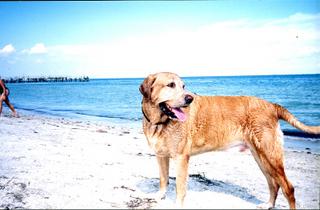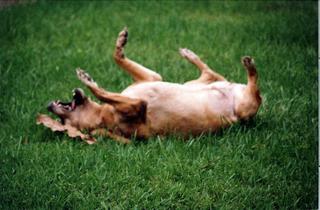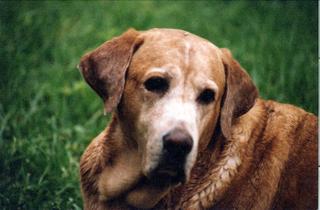September 26, 2005
Postcard from the Edge
 Dear Grandma,
Dear Grandma,Greetings from Florida!
We sure miss you, and your little dog Lucy Lou, too! We miss you especially at low tide, which I know you love, when all that is covered comes to be revealed. The murky, tail-high water becomes sand laid bare or only dewclaw shallow for a long way out, almost to the sandbars at the mouth of the bay.
Everything goes muddy and squishy and just the way Labradors love the world. Little wet seaworm mounds shape the long shoreline, soft gooey piles in which I leave my wide Labrador paw prints. I neither know nor care if there are consternated worms in sandy tubes below. Mike calls it the littoral zone and carefully bows to the lovely, icky denizens of the muck. I, however, think of it all as Hank Heaven and romp as if it I owned it outright. Who better than I, grimy King Hank? Who could love it more and rule it with a surer, bolder, more playful paw?
There is everything here. The clam shells are thick and heavy and just begging to be skipped along the water's surface. I love chasing them down into the chest high water and then diving, diving, and diving again, my butt wagging and tail making wobbly circles in the air as I search underwater for the hearty shells. For this I was born. I feel it in every fiber of my hairy being, wrapped in a subcuteanous layer of fat I think makes me nearly a water mammal.
And if Mike refuses to skip clam shells for me, there are always the whelks, which I can find and dive for on my own. Oh, Grandma, how I yearn to crack them open like pistachios and eat the soft, salty snail inside, but Molly yells at me when I start to chew them. And I must admit that the sharp shards of shell do stick in my lips for hours afterwards. So, I treat them gingerly now, savoring the sweet, thick slickness of the grainy gravy spilling out of these lowtide denizens, my subjects. They must pay their dues while I am here, their homage to King Hank, the careless, carefree master of mudflats.
September 20, 2005
The Splendor of Pets That Blog

I CELEBRATE myself,
And what I assume you shall assume,
For every atom belonging to me, as good belongs to you.
-- Walt Whitman, Leaves of Grass
Not so long ago, I thought I was by myself, a lone Labrador in an Internet galaxy populated only by human beings, numerous as stars in the sky. In retrospect I realize I was being parochial, even Hankocentric. Where there is one, there are likely to be others. How often do we see a lone leaf of grass?
What Mike calls my SETI moment stemmed from a comment on my blog from someone named "simba and zoe." This sounded suspiciously nonhuman to me, and sure enough their comment led me to a blog called The Weekly Hairball, where two felines narrate their exploits. Extraordinary! Other nonhumans in the blogosphere!
But, of course, not so extraordinary. Their site led to others, mostly of the feline persuasion, and then sierracat provided a link to something called blogrings. Blogrings? Again, utterly new to the untutored Labrador. It was as surprising as the first time I saw that strange but strangely familiar dog in the bedroom mirror. I didn't know how to feel. I stood at attention, tail vertical, fur rising slightly, poised between fight and flight.
It slowly came to me that this was a mirror, too: a brave new world of blogging pets, arranged in a row like an electric totem pole made up cherished relations and animal spirits: outlandish, exotic, and achingly cuddly.
So peculiar, you think! So sappy and sad, endearing and mad. An expanding colony of blogging dogs and cats, along with a parrot or two. It made me question my self. What am I? What are we? Neither wholly fact nor flimsy fiction. Neither self nor, exactly, alter ego. We are the post-modern pets of tomorrow today. And we all roll shamelessly and gleefully in the verdant, virtual grass of our newly discovered homeland.
September 17, 2005
In Search of Rescue
Searching and rescuing is something that seems to be encoded deep into the genes of many a dog. Even some untrained Labradors like our Hank can barely restrain themselves from coming to the aid of family members who're floundering or even floating in the water. Hank always wants to swim in, with that worried expression on his face, and help, even if he's not exactly sure how.
His more expert brothers and sisters have, in fact, found and rescued many people thoughout history. It's only fitting that we return the favor out of both love and gratitude. So, this note is a tribute to those heroic but regular folks who have risked - and continue to risk - their safety and sometimes their very lives in order that many a trapped, stranded, and struggling pet may survive the Katrina disaster.
I've read a number of rescue stories and hope they're all true. There's the one about people who swam through part of downtown New Orleans, with water up to their necks, to rescue trapped Dobermans. "They took one of the doors they had broken down and put the Dobes on it and floated them out," reads the article. "The door started sinking so they carried one and put the other 2 on their backs. They came to a Wildlife and Fisheries boat who told them they could get in the boat but the Dobes could not. The GCDR rescuers responded, 'We swam in and we will swim out.' Then the Wildlife and Fisheries took all of them in the boat."
"It's truly a race against the clock," said Wayne Pacelle, president and CEO of the Humane Society of the United States, over a week ago. "Our teams are working feverishly to rescue as many animals as possible and get out of the watery cesspool left behind by Hurricane Katrina, but we can't do it alone. We need the Coast Guard, fire departments, local rescue agencies, and anyone else who can lend a hand to rescue animals in need."
Later, though, it was reported that some teams of animal rescuers had to stop taking animals out of the devastation. "Rescuers trying frantically to save animals left behind when people fled Hurricane Katrina have given up on collecting pets and begun simply leaving food and water for them," reported MSNBC. It's said there was no more room available at the animal shelters. Still, much work continues to be done. I've been reading the daily dispatches from the Humane Society, for example.
For some animals, it is already too late. There were homes in the flooded St. Bernard parish, for example, where dogs had been tied or chained. They drowned, straining at their tethers, as the flood waters slowly rose. “It’s horrific. They told us before we left to leave our hearts behind,” said Tony Valenzuela of the Arizona Humane Society said.
Even among survivors, the strong bonds between people and pets have sometimes snapped. Traumatized dogs and cats can attack the very people trying to help, even their own owners. And some of the residents of the Louisiana area, claiming to be protecting themselves or their families, have even taken to shooting stray dogs in their neighborhoods. Probably the most horrific scene I've witnessed on the Internet so far is one among a series of National Geographic photos. It's too terrible to describe in these pages.
I'm under no illusions when it comes to rescue operations. I understand it's the people who must come first. But it's clear from the coverage that helping pets in a crisis can also help people.
"If there would have been something that was people/pet friendly, a lot of people would have left" before Katrina struck, said Joelle Rupert, who runs Animal Aid for Vermilion Area, a refuge about 150 miles outside of New Orleans. "They didn't want to get separated from pets. They are like members of the family," she said, according to the Washington Post. And the Reuters Foundation reports, "Would-be rescuers have watched in amazement time and again during the past week as pet owners refused to budge from flooded homes without a dog or cat. "
Even once they're evacuated, many don't want to leave their pets. "Some of these people will live on the streets and won't go to a shelter if they have to be separated from their pets," said Laura Bevan, the Humane Society's southeast regional director. I don't know how exactly how any of this can be changed but I think emergency service professionals need to learn from the pet/people dilemma before the next great storm approaches.
In the end, as strange as it seems, the suffering of the animals somehow makes the Katrina tragedy more poignant for people. One can't attach blame to pets for failing to prepare or evacuate or elect the right politicians. There is a kind of terrible purity in their victimhood. This is why people are so moved by the pictures of suffering pets, such as the oil-slickened dog shown wandering the streets of Chalmette, Louisianna.
And the loss of a pet somehow signifies a larger rending of the relationships that we all cherish as the emblem of our normalcy. When a small white dog named SnowBall was stripped from a sobbing child as he boarded a bus at the Superdome, it helped underline our outrage at all the losses suffered by so many.
Now, even as the waters recede in New Orleans, so inevitably will the attention that the nation pays to the suffering of the animals there - those lesser members of families who were, for lack of space and time and money, never evacuated to safety. The crisis is far from over, however. Volunteers continue to try to rescue and otherwise aid the many animal victims of Katrina. We offer them thanks. May the goodness and kindness they've shown be returned to them a thousand fold.
Below are just a few links to organizations that are trying to help:
- Humane Society of the United States 800-486-2631
- American Society for the Prevention of Cruelty to Animals 866-275-3923
- American Humane Association
- Noah's Wish 530-622-9313
- Hotline only for New Orleans residents who had to leave their pets behind: 225-578-6111
- Hotline for evacuees in the Houston area who need a place to house their pets: 713-802-0555
- PetFinder
September 15, 2005
Waiting
Usually, it works out fine. We sleep safely. Then the people return and we shake the sleep out of our bodies and all is right with the world.
But with Katrina, it was different. The winds whipped and people left, maybe thinking they'd be back soon. Except they weren't.
The photo that sticks out for me was not on the TV but in an article on the Internet. It's a picture of a dog sitting on the side roof of a house. The flood is all around him. Even the flat roof is puddled with water and littered with branches, grit and blown boards. It looks like the end of the world. And still the dog waits.
"If you are home and are ordered to evacuate, take your pets with you," the article says. Mike says maybe some people screwed up and panicked, or maybe they had to leave without a car, or go to a shelter that didn't allow dogs. The waters were rising. Maybe they had no choice.
Maybe not. A dog waits in the ruins for them either way.
September 14, 2005
The Inhuman Condition
The television had lots and lots of terrible Katrina stories about humans. Humans on roofs. Humans hanging from helicopter ropes. Fighting, shooting and looting humans. Angry humans and thirsty humans and abandoned humans. Most of all, suffering humans. I hated it. I've heard that people hate to see animals suffer. The same is true for dogs. We just hate seeing humans suffer. It frightens and disheartens us. Our tails wag slowly, uncertainly. We want to be reassured.
But reassurance was hard to come by, even hundreds of miles from the suffering. Mike said, "The apocalypse will be televised," whatever that meant. He ground his flat teeth for a while and then sent money over the Internet somehow. Then he ground his teeth some more. He complained to me and, when Molly was home, he complained to her. Then Molly in her wisdom did reassure me in a cooing voice, though Mike just pounded the furniture. "You're scaring the Labrador," she scolded. It was true.
Sometimes I'd catch a glimpse of a pet. I saw a dog in a boat one time. Another time I saw a boy carrying a big tupperware container full of live orange tabby cats. But where were the rest of the animals, I wondered? There should be more animals.
September 12, 2005
Katrina and Me
Normally, we Labs love foul weather. Mike puts on his shiny, slick poncho thing, looking like a green phantom, and my tail can't help but wag. But hurricanes are different. Mike stiffens and sweats anxious smells. That's what happened when Hurricane Katrina was going through Florida. It think it's because of what happened last year, when hurricane winds sent our roof shingles slicing through the air into the yard and neighboodhood. Those shingles sure smelled funny, like beach sand stuck in tar.
Anyway, Mike got happier when it looked like Katrina wouldn't hit us. He didn't want to me to have the chance to smell our new shingles in the yard. But he got solemn when it looked like the storm might hit some place called New Orleans. I didn't know much about that place except, as Mike told me, it's not really so new and it's shaped kind of like my water bowl. Except it's supposed to be dry.
After it hit, Molly and Mike didn't seem too upset by the TV reports because the water bowl didn't fill up after Katrina went through. Then something happened. Water happened. I usually love water but I guess this wasn't the good kind. It was dark, dirty water and it filled the town like black, oily dread.
That's when I heard about the pets of New Orleans. The TV people were asking the people in the city why they didn't leave, and some said they didn't want to leave their pets. And they shouldn't have to!. Mike always said he and Molly weren't even allowed to leave me in the house alone if they have to leave when a hurricane hits. But sometimes people do it anyways because most storm shelters don't take pets. That made me sulk like a Blood Hound on the sofa for a while. It also made me watch the Katrina story harder. I didn't like what came next.
September 11, 2005
Leading Humans by the Nose
But you know why? Because they're all suffering from anosmia (I looked it up) and don't even realize it. You can't believe some of the interesting, pungent odors wafting from Mike and Molly. I mean, I can tell where they've been, what they've been doing, what they've eaten, how they're feeling, and even whether they're in a playful mood - and all with a good, swift sniff. Their method of finding out what's going on usually involves lots of long, boring talk. It's so slow and, I've got to say, less accurate. Humans can hide lots of stuff from each other, but they can't hide much from the hound.
Which is why they need us. I was reading in an article the other day that the poor humans have only got about 5 million olfactory cells in their noses compared to about 300 million in dogs. Now, I'm not too good with numbers but I think that's a sort of Irish Wolfhound vs. Chihuahua kind of difference. Forget seeing eye dogs. What all the humans need are smelling nose dogs.
In fact, that article says that canines "have been humankind's detection and tracking device of choice for hundreds, if not thousands, of years." They depend on us for hunting. Not to mention searching and rescuing. Not to mention locating other humans and sniffing out drugs and bombs. It sort of makes a Labrador proud to think the humans at least have enough sense to let us lead them by the nose when it really counts.
Except now I hear they're building their own noses. In airports, they've got sniffer machines. For us dogs, it's not a big surpise that humans are trying to replace us with gadgets. Sometimes it's hard for me to tell where the humans end and the thingamajigs begin. It's not just the clothes, which are weird but at least better than the freakish hairlessness. It's the other stuff, merging seemlessly with their clever paws like varied yet interchangeable tentacles: knives and forks, pens and computer mice, iPods and cell phones, power drills and the ever horrid vacuum cleaners.
Of course, there are truly lovely machines such as refrigerators and electronic can openers, things even the most skeptical of canines can appreciate. Still, the endless human doodads make us uncomfortable and sometimes even alarm us, especially when they're built to mimic living thing, including dogs. That's why I think that if one of those airport sniffer machines ever shows up in the park where my friends and I gather, we will approach it cautiously at first. But then, if it has no electric jaws, we'll treat it the same way we do your average fire hydrant, except more so.

